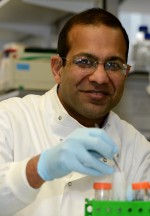
Professor Hemant Kocher
Grant made in 2018 Award RoundProfessor Kocher’s project will investigate why immunotherapy - a treatment which harnesses the patient’s immune system to kill cancer cells - doesn't work with pancreatic cancer.

All the research we support is funded entirely by public donations. To date, 73 projects have been funded, with a total value of over £15.6 million. These are focused on early diagnosis of pancreatic cancer and the development and monitoring of new treatments.

Professor Kocher’s project will investigate why immunotherapy - a treatment which harnesses the patient’s immune system to kill cancer cells - doesn't work with pancreatic cancer.

In a project co-funded with Worldwide Cancer Research, Dr Cameron aims to prevent normal cells in the pancreas from supporting pancreatic cancer growth and resistance to cancer treatments.

This new project will investigate the exact role of the molecule avb8 which sits on the cell surface of many types of pancreatic cancer.

Professor Friend and Mr Srikanth Reddy will conduct a pilot study to treat 20 pancreatic cancer patients who are not eligible for surgery with high intensity focused ultrasound.

Dr Wells will investigate the interaction between two proteins called PAK4 and p85 which she believes helps pancreatic cancer to spread.

Dr Cornelissen’s project aims to detect pancreatic tumours earlier and evaluate treatments faster using imaging equipment routinely used in hospitals.

This project will design immune cells that can specifically attack cells displaying different markers, with the aim of developing personalised treatments for pancreatic cancer.

Dr. McNamara will examine blood and tissue samples donated by patients with later stage disease to look for genetic mutations similar to those found in breast and ovarian cancer, for which there are known treatments.

Dr McClelland is investigating whether limiting certain chromosomal defects in pancreatic cancer cells will improve the effectiveness of treatments.

Professor Marshall is testing a peptide drug against different types of pancreatic cancer, prior to taking it into a clinical trial.